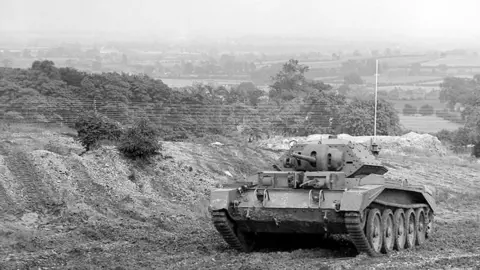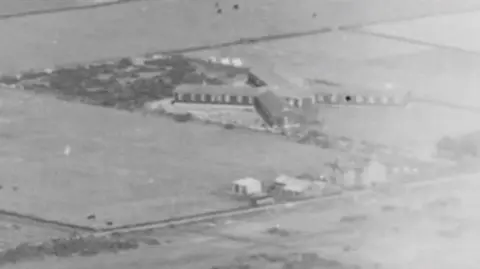Sand dunes give up secrets of lost wartime railway
 Getty Images
Getty ImagesA hidden railway among the sand dunes of a Welsh forest used for key military training during World War Two has been unearthed by archaeologists.
The Morfa Gunnery Range, complete with accommodation for troops, engine sheds and links to the mainline railway, was spread over a thousand acres of what is now Harlech Forest on the coast of north-west Wales.
The centrepiece was a 5km (3 mile) railway line which allowed soldiers to fire anti-tank guns at carriages as they were towed along the track.
"The railway is a really exciting relic, about which we knew very little before," said Jane Kenney, who led the dig for Heneb - the Welsh Trust for Archaeology.
The full route of the target railway was identified using laser imaging techniques and aerial photographs, with a 1km length surveyed on the ground in detail.
What remains is a 2m (6ft 7in) high protective bank supported by a wall made from concrete-filled sandbags.
"Anti-tank training ranges were rare in Britain at the time, and this is a particularly well-preserved example with an unusual and extensive track system for the targets," said Ms Kenney.
The survey of the site was funded by Natural Resources Wales' (NRW) Sands of Life project which aims to rejuvenate dunes across Wales.
Most of the lost railway embankment was covered in scrub, bramble, debris and conifer trees but a 1km stretch was cleared by NRW allowing the remains of the rail line to be inspected and surveyed.
"Despite its size and importance, the training range has never been fully researched and recorded and clearing parts of the site allowed us to find out more about it," Ms Kenney explained.
"Although relatively recent history, the importance of Second World War archaeology is becoming increasingly recognised by experts and the public alike."
 Natural Resources Wales
Natural Resources Wales "The clearance work we have carried out allowed this important Special Area of Conservation to be fenced and grazed to maintain its wildlife value," said Kathryn Hewitt, Sands of Life project manager for NRW.
"But as well as helping protect the natural environment, this work has made this important historical structure easier to see and access."
Much of the range is still hidden beneath Harlech Forest but the public can follow the wartime concrete roads and see the railway embankment at the most westerly side of the forest where it opens out onto the dunes.
